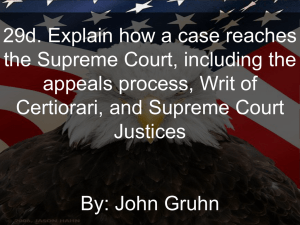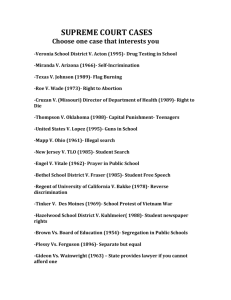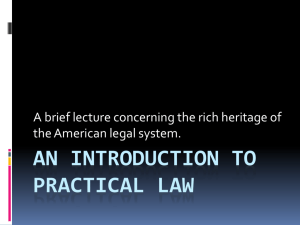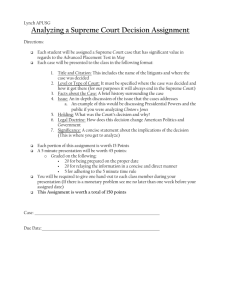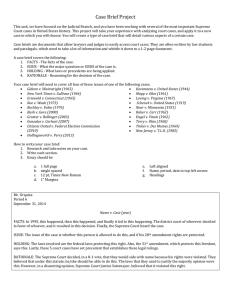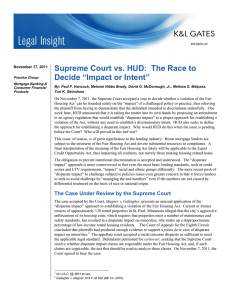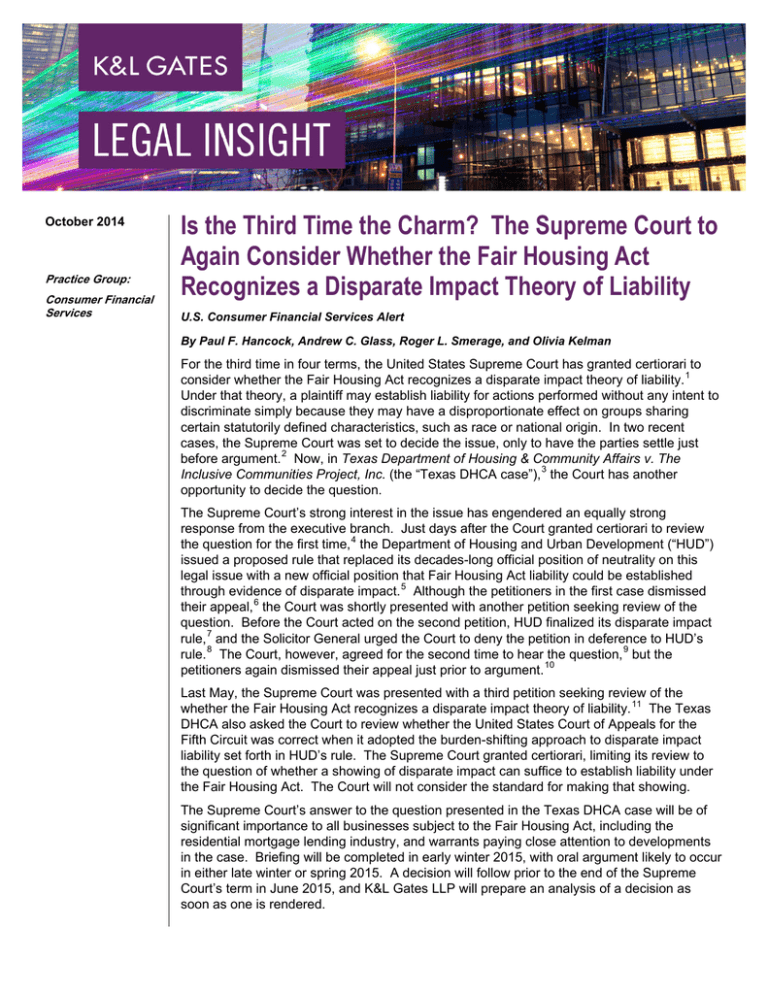
October 2014
Practice Group:
Consumer Financial
Services
Is the Third Time the Charm? The Supreme Court to
Again Consider Whether the Fair Housing Act
Recognizes a Disparate Impact Theory of Liability
U.S. Consumer Financial Services Alert
By Paul F. Hancock, Andrew C. Glass, Roger L. Smerage, and Olivia Kelman
For the third time in four terms, the United States Supreme Court has granted certiorari to
consider whether the Fair Housing Act recognizes a disparate impact theory of liability. 1
Under that theory, a plaintiff may establish liability for actions performed without any intent to
discriminate simply because they may have a disproportionate effect on groups sharing
certain statutorily defined characteristics, such as race or national origin. In two recent
cases, the Supreme Court was set to decide the issue, only to have the parties settle just
before argument. 2 Now, in Texas Department of Housing & Community Affairs v. The
Inclusive Communities Project, Inc. (the “Texas DHCA case”), 3 the Court has another
opportunity to decide the question.
The Supreme Court’s strong interest in the issue has engendered an equally strong
response from the executive branch. Just days after the Court granted certiorari to review
the question for the first time, 4 the Department of Housing and Urban Development (“HUD”)
issued a proposed rule that replaced its decades-long official position of neutrality on this
legal issue with a new official position that Fair Housing Act liability could be established
through evidence of disparate impact. 5 Although the petitioners in the first case dismissed
their appeal, 6 the Court was shortly presented with another petition seeking review of the
question. Before the Court acted on the second petition, HUD finalized its disparate impact
rule, 7 and the Solicitor General urged the Court to deny the petition in deference to HUD’s
rule. 8 The Court, however, agreed for the second time to hear the question, 9 but the
petitioners again dismissed their appeal just prior to argument. 10
Last May, the Supreme Court was presented with a third petition seeking review of the
whether the Fair Housing Act recognizes a disparate impact theory of liability. 11 The Texas
DHCA also asked the Court to review whether the United States Court of Appeals for the
Fifth Circuit was correct when it adopted the burden-shifting approach to disparate impact
liability set forth in HUD’s rule. The Supreme Court granted certiorari, limiting its review to
the question of whether a showing of disparate impact can suffice to establish liability under
the Fair Housing Act. The Court will not consider the standard for making that showing.
The Supreme Court’s answer to the question presented in the Texas DHCA case will be of
significant importance to all businesses subject to the Fair Housing Act, including the
residential mortgage lending industry, and warrants paying close attention to developments
in the case. Briefing will be completed in early winter 2015, with oral argument likely to occur
in either late winter or spring 2015. A decision will follow prior to the end of the Supreme
Court’s term in June 2015, and K&L Gates LLP will prepare an analysis of a decision as
soon as one is rendered.
Is the Third Time the Charm? The Supreme Court to Again
Consider Whether the Fair Housing Act Recognizes a
Disparate Impact Theory of Liability
Authors:
Paul F. Hancock
Andrew C. Glass
Roger L. Smerage
Olivia Kelman
paul.hancock@klgates.com
+1.305.539.3378
andrew.glass@klgates.com
+1.617.261.3107
roger.smerage@klgates.com
+1.617.951.9070
olivia.kelman@klgates.com
+1.305.539.3382
Anchorage Austin Beijing Berlin Boston Brisbane Brussels Charleston Charlotte Chicago Dallas Doha Dubai Fort Worth Frankfurt
Harrisburg Hong Kong Houston London Los Angeles Melbourne Miami Milan Moscow Newark New York Orange County Palo Alto Paris
Perth Pittsburgh Portland Raleigh Research Triangle Park San Francisco São Paulo Seattle Seoul Shanghai Singapore Spokane
Sydney Taipei Tokyo Warsaw Washington, D.C. Wilmington
K&L Gates comprises more than 2,000 lawyers globally who practice in fully integrated offices located on five
continents. The firm represents leading multinational corporations, growth and middle-market companies, capital
markets participants and entrepreneurs in every major industry group as well as public sector entities, educational
institutions, philanthropic organizations and individuals. For more information about K&L Gates or its locations,
practices and registrations, visit www.klgates.com.
This publication is for informational purposes and does not contain or convey legal advice. The information herein should not be used or relied upon in
regard to any particular facts or circumstances without first consulting a lawyer.
© 2014 K&L Gates LLP. All Rights Reserved.
1
See Texas Department of Housing & Community Affairs v. The Inclusive Communities Project, Inc., --- S. Ct. ---, 2014
WL 4916193 (Oct. 2, 2014) (No. 13-1371).
2
See Magner v. Gallagher, S. Ct. No. 10-1032, and Township of Mount Holly v. Mt. Holly Gardens Citizens in Action, Inc.,
S. Ct. No. 11-1507.
3
S. Ct. No. 13-1371.
4
See 132 S. Ct. 548 (Nov. 7, 2011) (No. 10-1032).
5
See Implementation of Fair Housing Act’s Discriminatory Effects Standard, 76 Fed. Reg. 70,921, 70,926-27 (Nov. 16,
2011). For more information on the proposed rule, see K&L Gates’s alert, Mortgage Industry Submits Comments on
HUD’s Proposed Disparate-Impact Rule under the Fair Housing Act.
6
See Stip. to Dismiss Writ of Certiorari, Magner v. Gallagher (Feb. 14, 2012) (No. 10-1032). The stipulation of dismissal
was not without controversy and involved a possible quid pro quo for the dismissal by the federal government of a
different suit it had brought against the petitioners, leading to investigation by the House of Representatives. See Press
Release, U.S. House of Representatives Comm. on the Judiciary, Members Probe Justice Dep’t on Lawsuit Quid Pro Quo
Arrangement (Sept. 27, 2012), available at
http://judiciary.house.gov/index.cfm/2012/9/membersprobejusticedeptonlawsuitquidproquoarrangement. The House also
passed legislation preventing HUD from using appropriations to carry out its proposed rule, if finalized. See H.R. 5972,
112th Cong., § 425 (as passed by House, June 29, 2012).
7
See Implementation of Fair Housing Act’s Discriminatory Effects Standard: Final Rule, 78 Fed. Reg. 11,460, 11,478
(Feb. 15, 2013).
8
See Brief for the United States as Amicus Curiae, Township of Mount Holly v. Mt. Holly Gardens Citizens in Action, Inc.
(May 17, 2013) (No. 11-1507), available at http://www.justice.gov/osg/briefs/2012/2pet/6invit/2011-1507.pet.ami.inv.pdf.
9
See 133 S. Ct. 2824 (June 17, 2013) (No. 11-1507).
10
See Stip. to Dismiss Writ of Certiorari, Township of Mount Holly v. Mt. Holly Gardens Citizens in Action, Inc. (Nov. 15,
2013) (No. 11-1507).
11
See Inclusive Cmtys. Project, Inc. v. Tex. Dep’t of Hous. & Cmty. Affairs, 747 F.3d 275, 282 (5th Cir. 2014).
2

